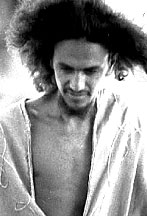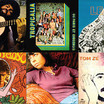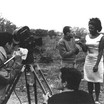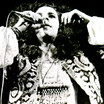Ilumencarnados seres

caetano veloso
Biographies
Singer and composer Caetano Veloso was born in 1942, in Santo Amaro da Purificação, Bahia. In 1960, by now living in the state capital of Salvador, Caetano enrolled in Philosophy at UFBA. It was during this time that he met a number of other artists from Bahia, who would soon have a decisive role in his career.
“botei todos os fracassos na parada de sucessos“
In 1964, still in his home state, Caetano was part of the show Nós, Por Exemplo, alongside Gilberto Gil, Tom Zé, Gal Costa, Maria Bethânia and other artists. The following year, he traveled with his sister Maria Bethânia to Rio de Janeiro, where she would replace singer Nara Leão in the show Opinião. In 1967, already recognized as a talented lyricist, he shared his first LP, Domingo, with Gal Costa and, alongside the Beat Boys, defended his own song “Alegria, alegria” at the 3rd Festival of Brazilian Popular Music on Record Television. This event marks the birth of Tropicalism and is considered a milestone in the early history of the movement.
After a series of shows, the always controversial movement headed by Caetano and Gilberto Gil was repressed by the military regime. Both artists were arrested, and sent into political exile in 1969. Caetano left for London, where he made two records. Three years later, the artist returned to Brazil with a new look and a new musical proposal. In Salvador, he shared a show with Chico Buarque at the Castro Alves Theatre.

In 1973, Caetano released his most experimental album, Araçá Azul, a record-breaker in terms of returns demanded by listeners. After the records Jóia and Qualquer Coisa, released in 1975, Caetano joined Gil, Gal and Bethânia to form the group Os Doces Bárbaros. Throughout the second half of the 70’s, Caetano released ground-breaking albums such as Muito, Cinema Transcendental and Bicho.

In the 80’s, Caetano incorporated new sound elements into his work, such as pop-rock in the 80’s, and rap in the albums Uns, Velo, Outras Palavras and Estrangeiro. In 1986, Caetano presented the musical Chico & Caetano, with Chico Buarque on TV Globo. That same year, he directed the feature-length film Cinema Falado.
In 1997, Caetano launched Verdade Tropical, the memoirs of Tropicalism, and the awarded album Livro, Grammy-winner in 2000 in the category Best World Music Album. In 1999, owing partly to the popularity of the mega-hit “Sozinho” (composed by Peninha), Caetano’s live CD Prenda Minha sold over one million copies.
That same year, Caetano produced João Gilberto’s new album, and released the CD Omaggio a Federico e Giulietta, with songs about the filmmaker Federico Fellini, which he performed next to Lenine at Cité de La Musique, Paris. Caetano’s international reputation expanded from 2002, after he worked in the films Talk to Her, by Pedro Almodóvar, and Frida, by Julie Taymor.
In December 2000, the CD Noites do Norte was released with new compositions; in 2002, Eu não peço desculpas with Jorge Mautner; A foreign sound, with American standards, was launched in 2004; and, finally, in 2006, Caetano released the surprising Cê, with a new rock-and-roll repertoire.





























